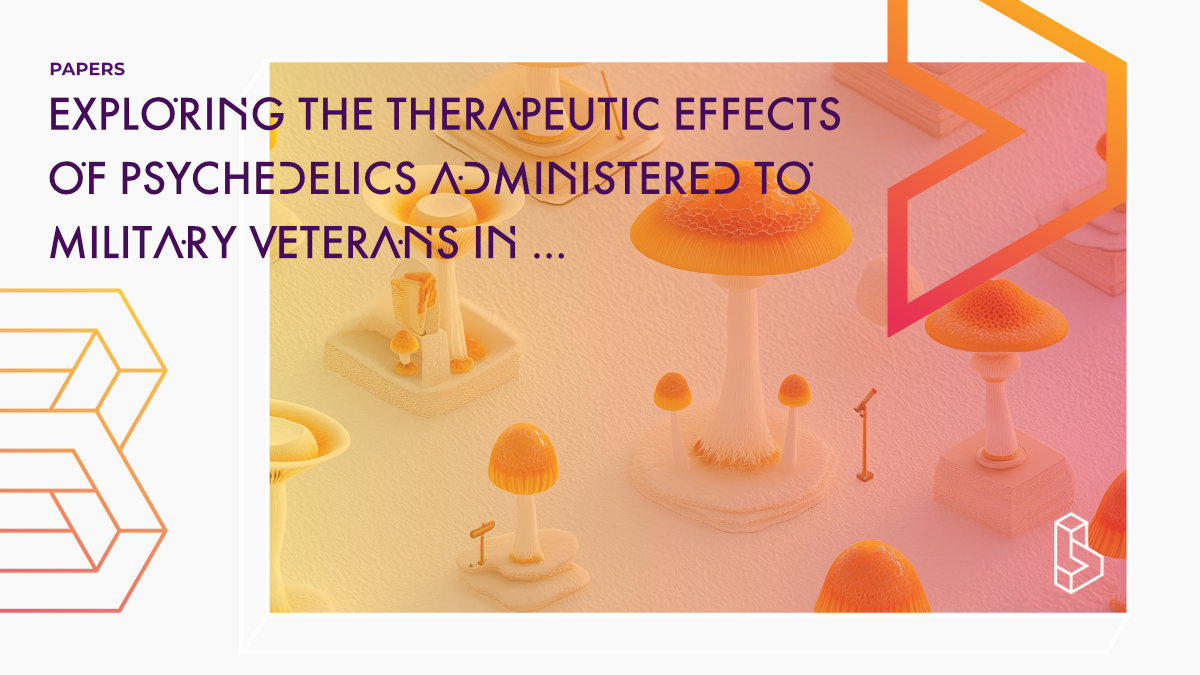This observational retreat study (n=58) of military veterans attending psilocybin (n=13) or ayahuasca (n=45) retreats found significant improvements across all eight measured domains four weeks later, with the largest percentage reductions in depression (PHQ-9, 29%) and PTSD symptoms (PCL-5, 26%). Psilocybin outperformed ayahuasca on seven outcomes (ayahuasca led slightly on PTSD), men improved more than women on most scales, and greater baseline severity predicted larger post-retreat gains.
Abstract of Exploring the Therapeutic Effects of Psychedelics Administered to Military Veterans in Naturalistic Retreat Settings
“Background: Military veterans are at risk of various mental health conditions, with profound implications for post-deployment quality of life. Current treatment options encounter high dropout rates and non-responsiveness, and overlook the importance of community building in veterans’ holistic recovery. Preliminary research suggests psychedelics offer therapeutic benefits for depression and post-traumatic stress disorder (PTSD) in veterans. Integrating psychedelic therapies with a communal retreat setting could provide a more holistic framework for improving veterans’ well-being.
Objectives: To evaluate the effects of psychedelic retreats on mental health and community reintegration in veterans.
Methods: Fifty-eight veterans attended psilocybin or ayahuasca retreats. Participants completed eight mental health questionnaires (e.g. PTSD Checklist, PCL-5; Patient Health Questionnaire, PHQ-9), and the Military to Civilian Questionnaire (M2C-Q) up to 4 weeks both pre- and post-retreat. Paired t-tests analyzed changes in outcome responses between time points, and gender and substance-specific analysis was conducted. Baseline scores were correlated with improvements in PCL-5 and PHQ-9 to investigate the relationship between initial symptom severity and percentage improvement following the retreat.
Results: Significant improvements were found for all eight outcomes post-retreat, with the greatest percentage improvements found for depression (PHQ-9; 29.1%) and PTSD (PCL-5; 26.1%). Veterans attending psilocybin retreats showed greater improvements in seven out of eight outcomes, whereas ayahuasca retreats demonstrated greater improvements in PCL-5 scores for PTSD (ayahuasca: 26.4%; Psilocybin 24.8%). Male participants experienced greater improvements across all outcomes apart from the PCL-5 for PTSD (Male: 24.1%; Female: 32.1%). Higher baseline scores on the PCL-5 (PTSD) and PHQ-9 (depression), indicating worse initial mental health, correlated with greater outcome improvements.
Conclusions: This is the first study to investigate psychedelic retreats as a holistic therapy for veterans’ mental health alongside community reintegration. Psilocybin and ayahuasca retreats significantly improved veterans’ mental well-being, quality of life, PTSD, anxiety, depression, sleep, concussion, and post-deployment reintegration. Participants with more severe symptoms have the potential to benefit most from this intervention, with nuanced insight into improved outcomes based on gender and type of substance. Psychedelic retreats could provide a treatment framework to aid veterans’ recovery by addressing psychological well-being, communal factors, and reintegration into civilian life.”
Authors: Megan Calnan, Grace Blest-Hopley, Chris Busch, Milly Adams, Simon G. D. Ruffell, Theodore Piper, Leor Roseman, Hannes Kettner & Robin L. Carhart-Harris
Summary of Exploring the Therapeutic Effects of Psychedelics Administered to Military Veterans in Naturalistic Retreat Settings
Military veterans experience disproportionately high rates of post-traumatic stress disorder (PTSD), depression, anxiety and traumatic brain injury, yet conventional psychotherapies and pharmacological agents yield modest response rates, high drop-outs and enduring stigma. Calnan and colleagues therefore explored whether placing psychedelic administration inside a purpose-built retreat scaffold—emphasising communal preparation and integration—could address these therapeutic gaps by combining pharmacological, psychological and social mechanisms within a single intervention.
The authors highlight earlier research showing that serotonergic psychedelics such as psilocybin and N,N-dimethyltryptamine (DMT, the principal psychoactive in ayahuasca) can catalyse rapid, meaningful shifts in mood and cognition. They also note that mystical-type experiences, enhanced neural communication and increased neuroplasticity are theorised drivers of change. Against this backdrop, the present observational study set out to evaluate short-term changes in eight validated mental-health outcomes and one reintegration measure following psilocybin or ayahuasca retreats, and to test whether baseline symptom severity, gender or substance moderated response.
Methods
Participants
Study details
Compounds studied
Psilocybin
Ayahuasca
Topics studied
Depression
PTSD
Anxiety
Study characteristics
Observational
Participants
58
Humans

